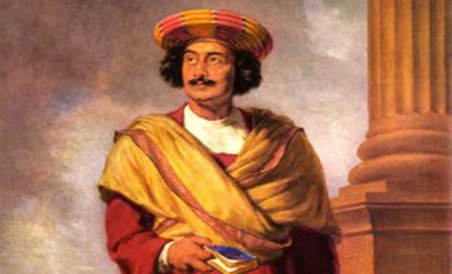Ram Mohan Roy: The Early Life
Ram Mohan Roy was born on May 22, 1772, in Radhanagar, Bengal, during British colonial rule. Belonging to a prosperous Brahman family, little is known about his early life and education. However, it is evident that he developed unorthodox religious ideas at a young age and became proficient in several languages, including Sanskrit, Persian, Arabic, Bengali, Hindi, and English.
Ram Mohan Roy’s Religious Reforms
In the early 19th century, Ram Mohan Roy embarked on a mission to reform traditional Hindu culture and address social issues prevalent in Indian society under British rule. He condemned superstitions and religious divisions within Hinduism and between various religions. His vision was rooted in a monotheistic Hinduism where reason guided the followers to worship the Supreme God, transcending human knowledge.
The Enlightenment and Western Influence
During his association with John Digby, a British East India Company official, Ram Mohan Roy was exposed to Western culture and literature. This exposure greatly influenced his religious studies and prompted him to seek a philosophical basis for his beliefs in the Vedas and Upanishads. His translations of these ancient Sanskrit texts into Bengali, Hindi, and English played a significant role in spreading his ideas.
The Vision of a Monotheistic Hinduism
Ram Mohan Roy’s central theme revolved around the worship of the Supreme God, who is beyond human comprehension and sustains the universe. His advocacy for a monotheistic form of Hinduism was groundbreaking and laid the foundation for modern religious thought in India.
Translation and Philanthropic Efforts
Besides his religious reforms, Ram Mohan Roy was an avid translator and philanthropist. He translated Hindu classics like the Ramayana into English and made the Bible accessible to the masses by translating it into several Indian languages, including Bengali, Punjabi, Oriya, Assamese, Marathi, Hindi, and Sanskrit.
Political and Social Contributions
Ram Mohan Roy’s contributions extended beyond religious and literary endeavors. He engaged in political discussions and social issues, advocating for various reforms. His efforts to promote education, end the practice of Sati, and support women’s rights were revolutionary for his time.
Raja Ram Mohan Roy: The Maker of Modern India
Given his significant contributions to Indian society, Raja Ram Mohan Roy earned the title “Father of modern India.” His efforts to reform Hinduism, promote education, and fight social evils were instrumental in the Indian Renaissance in the Bengal Presidency. As the founder of Brahmo Samaj, a socio-religious reform movement, he left an indelible mark on India’s cultural and intellectual landscape.
Mahatma Gandhi: Father of the Nation
While Raja Ram Mohan Roy’s contributions were critical in the early 19th century, the title “Father of the Nation” is commonly associated with Mahatma Gandhi. Celebrated not only in India but also in numerous nations worldwide, Gandhi’s role in India’s struggle for independence against British rule was iconic. His principles of non-violence and civil disobedience inspired millions and made him a revered figure in the history of India’s freedom movement.
Dr. B. R. Ambedkar: Father of the Republic of India
Dr. B. R. Ambedkar, another eminent figure, is often hailed as the “Father of the Republic of India.” His tireless efforts in drafting the Indian Constitution, which aimed to uphold democratic principles and promote equality and justice, earned him this prestigious title. As an ardent fighter against the caste system and a champion for the rights of the marginalized, he left an indelible impact on the nation.
Potti Sreeramulu: Father of Linguistic Democracy
Potti Sreeramulu, a lesser-known yet significant figure, is regarded as the “Father of Linguistic Democracy.” He passionately advocated for linguistic statehood, recognizing the diverse linguistic groups in India. His selfless sacrifice, fasting for the creation of an independent Andhra State, eventually led to the formation of linguistic states, fostering unity in diversity.
William Carey: The Father of Modern Missions
William Carey, an English Christian missionary, played a crucial role in Indian history. His work in translating the Bible into various Indian languages, promoting education, and campaigning against social evils like Sati made him a pioneer in missionary efforts. He is often hailed as the “father of modern missions” for his transformative impact on India’s religious and educational landscape.
Impact and Legacy of Raja Ram Mohan Roy
The legacy of Raja Ram Mohan Roy continues to influence Indian society and thought. His advocacy for social reforms, religious tolerance, and education laid the groundwork for a more inclusive and progressive India. His contributions, along with those of other esteemed figures, have collectively shaped modern India into the vibrant and diverse nation it is today.
Conclusion
In conclusion, various eminent personalities have earned the title “Father” of different aspects of India’s development. Among them, Raja Ram Mohan Roy, the Father of Modern India, holds a special place for his visionary religious reforms, philanthropy, and contributions to education and society. Alongside Mahatma Gandhi, Dr. B. R. Ambedkar, Potti Sreeramulu, and William Carey, he remains an integral part of India’s history, inspiring generations to come.
Read More: Quotes on Lord Rama: Celebrating the Eternal Virtues of a Revered Deity
FAQs
1. Who is considered the Father of Modern India?
Raja Ram Mohan Roy is considered the Father of Modern India for his religious reforms, promotion of education, and efforts to eradicate social evils during British colonial rule.
2. Why is Mahatma Gandhi called the Father of the Nation?
Mahatma Gandhi is called the Father of the Nation for his pivotal role in leading India’s struggle for independence against British rule using non-violent means and civil disobedience.
3. What is Dr. B. R. Ambedkar’s contribution to India?
Dr. B. R. Ambedkar’s significant contribution lies in drafting the Indian Constitution and advocating for the rights of marginalized communities, fighting against the caste system.
4. Why is Potti Sreeramulu known as the Father of Linguistic Democracy?
Potti Sreeramulu is known as the Father of Linguistic Democracy for his relentless efforts to establish linguistic statehoods, promoting the recognition of diverse linguistic groups in India.
5. How did William Carey contribute to India?
William Carey’s contributions to India include translating the Bible into Indian languages, promoting education, and campaigning against social evils like Sati, earning him the title “father of modern missions.”


